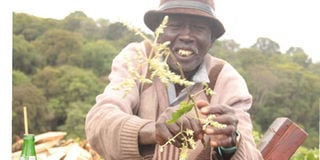Mysterious plant halts Sebei circumcision

Mzee Noah Cheruto, an elder in Sebei, shows the nukut plant recently. It is believed that once the plant flowers circumcision must be halted. Photo by Joyce Chemitai
It is believed that calamity can hit the land if circumcision is done during the period the plant, known as nukut, has flowered.
The reason? A mysterious plant locally referred to as nukut had flowered, which is considered bad luck.
“I had prepared myself but I have accepted it though I am so disappointed. 2018 is so far but I have no option since I do not want to suffer consequences,” Chebet says.
The cultural leaders, most of them over 60, say whoever undertakes circumcision either traditionally or medically is doomed. More than 10 elders reached this decision last Sunday in a closed door meeting.
Calamity looms
Noah Cheruto warned that the Sebei risk experiencing a calamity if the people carry on with this year’s initiation. The whole community is stunned. The first days of December, which are always characterised by feasting and merry-making in preparation for “the knife”, are silent.
“People have no option but to wait.
Elders across Sebei should give an ear to what the ancestors practiced and proclaimed. I will not step on any circumcision ground this year as has been my custom if some people go ahead,” says Cheruto, 82, one of the elders. He warned those who have become defiant and gone ahead to make preparations while on a local radio talk show.
The death of a boy, Silus Kiprotich,17, from Kabelyo village, Kabei, Bukwo in October after being cut is fast spreading in the region and even the elite believe it.
“There may be medical theories about the death of the boy but I believe the elders. I have a cultural identity, I belong to a tradition and elders have said it. We must respect what they say even when it is just recorded orally,” says Stephen Sayik, a 36-year-old secondary school teacher in Bukwo.
The decision also affects bulls due for castration.
A journey into Elgon forest with Micheal Chesakit, a resident of Kamakunga village in Kwoti, Kapchorwa District takes me to this mysterious plant. The nukut plant is a climber, with lime green shoots which turn white as they flower and mature.
It is believed that it flowers once every 15 to 20 years. Its flower, when opened is a replica of the male genital organ.
These plants are believed to have flowered in an even year in 1926, the circumcision season of an age-set called mucunku causing the boys to be cut in 1927 instead.
According to the elders, the plant could have flowered before in odd years and thus not affected the circumcision season unlike the current situation.
Currently the local leaders have embarked on informing the community about the reasons for postponing the rite of passage.
“We have discussed with the gender, culture and social services committee of council and elders have been given airtime to speak in some local radios across the region,” reveals Peter Kamuron, a councillor for the elderly at Kapchorwa District.
“Please for goodness sake, suspend the circumcision exercise until the tree shades off flowers,” Kamuron urges.
Kalenjin elders the across border in Kenya however, have divergent views about the current position of the elders in Uganda who are still deeply rooted in culture.
Reuben Butany Cherukut, the chairperson Saboat council of elders in Kenya, which also includes the Sabiny, says in Kenya they will circumcise.
He urges that the tree is sacred to the Sabiny only as the plant may not be found on the Kenyan side since different plants grow in different places.
“Among the Kalenjin, there are some trees that take long to flower and it is a belief in particular communities that when they flower, certain activities are stopped. In Kenya there are some trees that can make marriage ceremonies postponed if they flower as they are also associated with similar calamities.
So if it is true that the community here has noticed that the tree has flowered, I believe it is in order because they know the effects from long time practice and beliefs,” Cherukut says.
The Gisu community, who adapted circumcision from the Sabiny, however, proceeded with their circumcision season arguing that circumcision is simply postponed not stopped, a possibility that can happen even in Bugisu such as was the case in 1919 due to famine and prolonged drought.
“Postponement of circumcision in Sebei sub-region has nothing to do with stopping it. We are sure the postponement is based on some reason and it will take place in future,” says Umukukha Bob Mushikori, the cultural leader of Inzu Ya Masaba [Bumasaba cultural institution].
Some community members believe halting the circumcision based on the flowering of the nukut is simply being superstitious.
“I am sure the flowering of this plant has its own origin, besides, superstitious beliefs can surround any feature.
The community still needs education, exposure and willingness to abandon some beliefs embedded in culture,” says Maj John Seii, the ambassador designate of Kalenjins globally, adding that he would like to dissuade his colleagues from following such beliefs.




